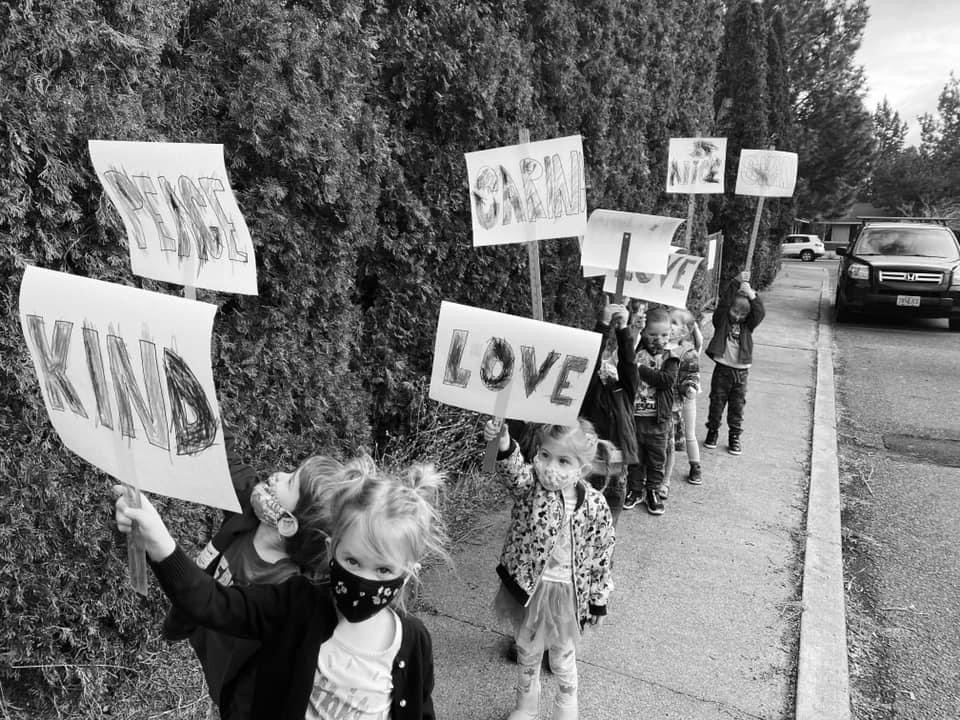January 24th Sermon, Rev. Dr. Steven Koski
Rev. Dr. Steven Koski
Other Articles in:
2021 January 24 Sermon
You know, if anything, covid-19 has reminded us, reminded us of a truth that we tend to forget that we’re connected, we rise and and we fall together, the polarization, the political divides seem to be building higher and higher fences every single day that that separates us.
And these fences, they run through our country, our communities, our churches, our friendships, our families, even our own hearts.
The attack on the capital, the blatant racism and the symbols of white supremacy that we’re on on full display were reminders, painful reminders of the dehumanization that characterizes so much of our life together.
You know, there are many who responded say, no, this is not who we are. We’re going to heal as a nation. If we’re going to heal. We need to face the unvarnished truth. This is precisely. Who we are and we keep proving it again and again and again, but it is not who we are meant to be. It is not who we can be.
It is not who God calls us to be. The divisions that divide us. Do not define. The possibilities between us. You know, there are some who have called for unity and there are others who are saying there can be no unity without justice.
And accountability. I think we need to be clear of what of what unity is not. You know, unity is not gathering in a circle, holding hands, sweeping everything under the carpet, being polite and nice to each other, ignoring the pain that we that we inflict on one another. Maybe unity begins by acknowledging the depth of our dis-unity.
Now, here’s a different perspective. We don’t create unity.
Unity is God’s gift to us that already exists. In our Book of Confessions. There’s there’s a confession called The Brief Statement of Faith, and it quotes Roman 12.
And it’s this this foundational truth where it says, in life and death, we belong to God.
We we belong to God and belonging to God, we belong to each other, it was Mother Teresa who said most of the violence in this world stems from the fact that we’ve forgotten that we belong to each other.
Madeline L’Engel, she wrote, We’re beginning to learn. We’re beginning to learn from astrophysicists and cellular biologists. Who teach us that us versus them? Is a violation of creation, creation exists and interdependence in unity. You know, a cell in your body, a cell in your body that forgets that that it actually exists to cooperate with other cells for the health of the whole body. We call that cell malignant.
We already are one. We imagine that we’re not.
And Madeline L’Engel says, we need to somehow reclaim our basic unity, we need to transform tribalism into community and friends, that this is not something that politicians can legislate.
This is the work of love. That is ours to do, neighbor to neighbor, heart to heart, you know, and Jesus taught us to pray. Jesus said, pray like this. Our father, he didn’t say my father. He said, give us this day our daily bread.
He didn’t say, give us give me my bread.
You know, it says in the Book of Corinthians, when one suffers, all suffer, in fact, fifty three times the apostle Paul.
Fifty three times the apostle Paul says our Lord nowhere does he say, my lord. You know the phrase Jesus, Jesus, as my personal savior, you might be surprised to discover that that appears absolutely nowhere in scripture. Do you know what appears in scripture, in the Book of Psalms? Behold, what a beautiful thing. When brothers and sisters dwell together in unity, the most fervent prayer of Jesus. John, 17. Father, may they be one, as you and I are one of these days?
So I’m going to keep telling the story, I’m going to keep telling the story until the light comes, you know the story where students asked a teacher, teacher, tell us. Tell us when night gives way to day. And the teacher says, when you look into the eyes of another, no matter who they are, even if they’re even if they’re your worst enemy. If you look into the eyes of another and you see a brother and you see a sister.
It is day. But if you look into the eyes of another. And you don’t see a brother or a sister. It is still night as people of faith. The work of love that is ours to do is to love in such a way that calls forth the dot, all of humanity is dependent on recognizing the humanity in one another.
This month, we’re focusing on words, words that spark, you know, the words we live by create the world we live in, change the words we live by. We change the world. Our world is addicted to living by the words us versus them. Imagine imagine if we lived by the word we. We just might change the world. In our Bible reading today, Jesus had just finished teaching his hometown crowd on the western side of the Sea of Galilee, and then he says to the disciples, let’s get in the boat and let’s go to the other side of the lake, to the eastern shore.
No doubt the disciples were like, what? Well, what’s on the other side? Literally, the other the other side of the lake was gentile territory.
So Jesus was really inviting his disciples to to to leave where they’re comfortable, where they’re safe to leave their echo chamber, where they’re surrounded by people who think like them, who share their values and to go to the other side and encounter the humanity of those they’ve spent a lifetime fearing and judging and demonizing those they’ve always kind of considered over there. The other as the enemy, you know, sometimes wonder what would happen if if we spent a month in the in a house sharing a house with those that we consider the other, you know, not coexisting, not kind of avoiding conversations, but a real intentionality about it, where we shared life, where we shared stories, where we shared meals with each other, where we didn’t avoid those hard conversations.
But in the conversation, we didn’t argue debate.
We didn’t try to convince the other that that were right.
We listened. We asked, where does it hurt? You know, what are the stories in your life that have that have shaped your worldview? What do you most fear?
Imagine what would happen if we learn to try to see each other as a brother or as a sister.
You know, not long ago, I was asked to speak at the Bend Chamber on the topic of of civility. One of the things I said is I think civility is is too low of a bar. You know, our goal in being a community together shouldn’t just simply be to tolerate each other, to be nice to each other, to be polite. Our commitment, our commitment should be to the hard work of humanizing each other, a clergy friend of mine in Minneapolis sent me this story of a parishioner of hers.
And it was right after the murder of George Floyd and all of the protests. And she was a black woman and she went to the nearby 7-Eleven to get a carton of milk and that she walked into the store. There were two white police officers talking to a white cashier, clearly discussing the protests.
Now, this woman became immediately kind of tense and she went to the back of the store to get her milk. One of the police officers came down the aisle towards her. And she immediately got kind of nervous. And this police officer said to her. How are you just kind of suspicious?
She said, fine, how are you? And there was this awkward silence. At the police officers said, no, ma’am. Really, how are you? And she she felt as if he actually cared, so she said, you know, if you want to know the truth, I’m angry.
I am so angry and I’m sad. But most of all, I’m tired. I’m so damn tired. This police officer looked her in the eyes. Send me to. And then he asked, can I give you a hug, and they hugged each other right there in the aisle of the 7-Eleven and this woman said later, I’d never met this this man before in my life.
In fact, I been taught that I should fear there are some who say I should hate him.
But in the midst of all of the ugliness around us and even the ugliness in my heart. Right there in the middle of the 7-Eleven, there was this beautiful moment, this hopeful moment when when two people took the risk. To see the humanity in one another and she said there should be more moments in the world like that. It says in the story that Jesus spoke to the storm and the waters became calm. You know, Jesus also speaks to to our inner storm.
And says “Peace. Be still.” I think one of the most radical things we can do right now is hold on to our inner peace as best we can.
I don’t mean burying our heads in the sand and pretending the the destructive chaos around us. Doesn’t exist or is inconsequential. I mean, finding moments. Funny moments to breed to to be still. Finding moments to ground ourselves. In the peace of Christ. So that we might engage and respond to the chaos and the destruction in a way that reflects the love of Christ. I mean, finding moments in the midst of all of the flurry and the rage and the frenzy.
To breathe, to pause. To be still, however you do that, whatever works for you, but to be still. To ground ourselves. In the love. That can do for us. What our love can’t do. Look at this picture. This picture is from cottage daycare here in Bend. Know, they ask their students, the children, they had them listen to Martin Luther King’s I Have a Dream speech, you know, his dream where he dreamed of a world where there’s no us and them.
There’s only we. And as they listen to Dr. King speak, they ask the kids, that’s the children. How do you how do his words make you feel? Then they ask the kids, that’s the children, what words would you like to see in the world? And they had the children make posters. And then they marched. Holding their posters. Representing the world that they want to see. Wow, Scripture says, and the children will lead them.
Friends. We’ve got to figure this out. Our children, our grandchildren. Their children. Need to see in us. A different way. A better way. Jesus took his followers. To the other side to encounter the humanity of the other. To love the other, to be reminded that in God’s heart, there is no “us” versus “them”. There is only we. We belong to each other. Who is your other? May God grace you with what you need.
To love in such a way, to love in a way that feels impossible right now, but to keep loving. Until it is possible.
May it be so.

